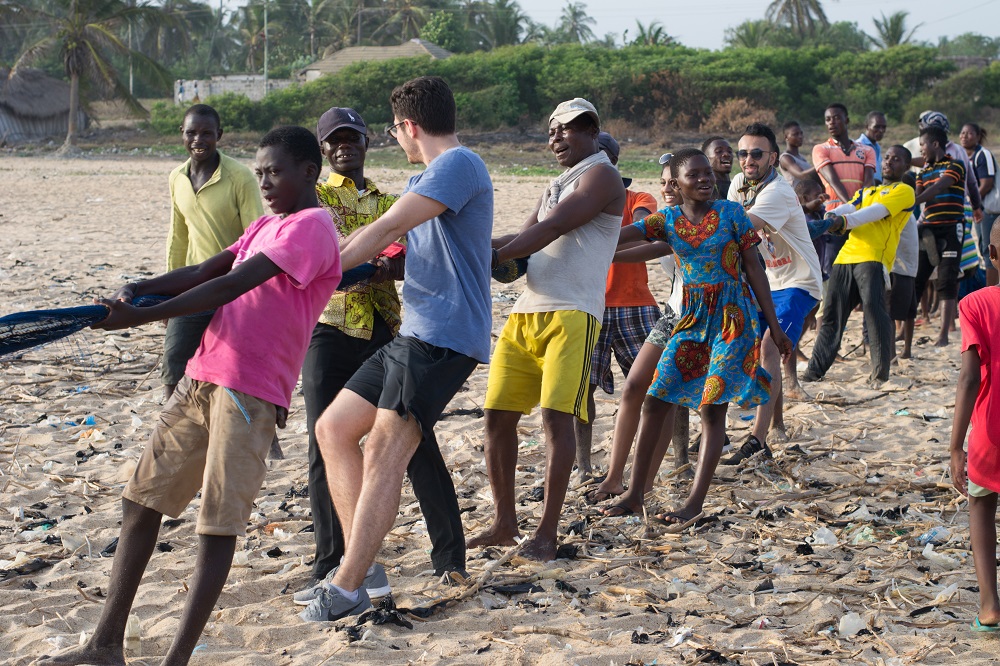“Medicine Is Its Own Language”
TouroCOM Harlem Students Visit Ghana on Medical Mission

As the seven TouroCOM Harlem students watched, a Ghanian doctor performed a caesarian section on an expectant mother. After the newborn was safely delivered, the nurse held the baby up and repeated a refrain that the TouroCOM students and their professor heard several times in the week they visited the small village in Ghana.
“You are welcome [woezer],” the nurse said to the child.
The seven TouroCOM students, members of TouroCOM’s International Medicine Club, and led by the club’s faculty advisor and TouroCOM faculty member Dr. Robin McKinney, spent a week in December in the village of Atorkor in the Volta region of Ghana. The goal of the trip was to broaden the future doctors’ cultural competency, said Dr. McKinney.
“Our trip to the village of Atorkor in Ghana, West Africa supports one of my personal missions to increase the practice of osteopathic medicine in communities both at home and abroad,” said Dr. McKinney. “I find it particularly important to expose medical students to cultures that are different from their own with the goal to expand their cultural competency. Some of our students will practice medicine outside of the United States where cultural competency will be a necessity. Many will remain in New York, one of the most culturally diverse cities in the world, where again cultural competency will be a necessity.”
Dr. McKinney continued: “My goal is to expose the medical students to as many international communities as possible as this exposure will serve them well both personally and professionally. We came to Atorkor bearing gifts wanting to serve a people that do not have the same medical luxuries we have here in the United States. We left feeling that we were the ones actually served with kindness, hospitality and friendship.”
The village is helped by the Atorkor Development Foundation that works to eradicate poverty in the area.
“We weren’t sure how the people would receive us,” said OMS I Kristen Gavidia. “But they had a welcoming ceremony for us.”
“The children in the village loved us,” said OMSII Bianca Chendrimada. “They followed us wherever we went and wanted to carry our belonging. They held our hands. Each of us had our own group of fans.”
The second day, the group visited the regional hospital and donned scrubs to get a first-hand look at medical care in the area.
“The hospital was better than we expected it to be,” said Chendrimada, “They had a lab and an operating room, but there were still 40-50 people waiting outside the ER. There were only 5-6 beds in the ER. It’s eye-opening to see how much need exists and how little healthcare is available.”
The students were invited to watch the caesarian section as well as going on grand rounds in the hospital with the working doctors who quizzed them on various diagnoses. Common ailments in the area were hypertension and malaria.
“Medicine is essentially its own language,” said OMS II Neginder Saini. “The issue for the hospital wasn’t the lack of knowledge, it was lack of resources. It humbled me to understand how these doctors worked without the fancy machinery that US hospitals have.”
During their visit, the students also went door-to-door to weigh all the babies and ask about residents’ health. OMS II Saini recalled explaining to villagers some of the causes of the diabetes the villagers were experiencing.
“It’s important to understand where they’re coming from and then work with them and their beliefs,” said Saini.
One evening, the group helped the local fisherman carry in the one large net they use to catch fish. Before the group left, the villagers presented each participant with a hand-made garb.
TouroCOM students have already launched a GoFundMe page to buy the village an ambulance.
“I’ve never met so many kind and genuine people,” said Chendrimada. “They’re so happy without the materialistic things a lot of us have, I almost felt a bit jealous. They were busy with their lives while we’re distracted by electronics and social media. It was a good way to see a different kind of life. From a medical standpoint it was important to see how medicine is practiced in a different setting and to become more culturally competent. All of this contributes to the kind of doctor you’re going to become.”

